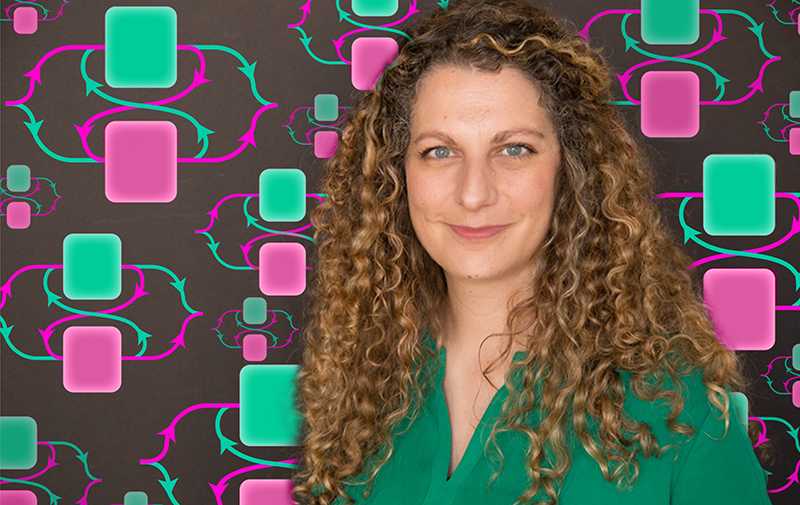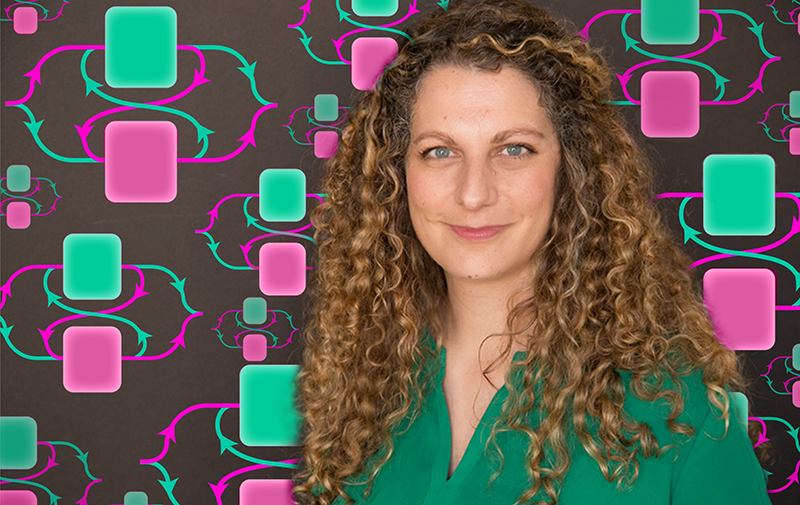Physics Scratches a Philosopher’s Itch
Which came first, the chicken or the egg? Both, says Elise Crull, who bases her answer on recent experiments that show that causal sequences can get mixed up in quantum circuits. A philosopher of physics at The City College of New York, Crull studies the results of experiments like these to try and tease out their meaning. Can causality coexist with quantum uncertainty? Why does the arrow of time point in one direction? Crull says that she doesn’t yet know the answers to these questions, but she thinks scientists could benefit from pondering such riddles.
Physics spoke to Crull to understand what it’s like to be a philosopher of physics. She shared her enthusiasm for digging into difficult problems and gave some advice for students on what course electives to choose.
All interviews are edited for brevity and clarity.
How did you end up as a philosopher of physics?
I studied physics and astronomy as an undergraduate and really loved quantum mechanics. I was very interested in trying to get to the bottom of all things, and quantum physics scratched that itch. In my junior year, I learned that there was a subfield of philosophy called philosophy of science, and I thought: that is what I want to do for the rest of my life.
What does your job entail?
My research has two different tracks. The first is historical and involves poring over archives to rediscover lost voices in the foundations of quantum physics. One of those voices is that of the German neo-Kantian philosopher, Grete Hermann, who worked in the 1930s on early interpretations of quantum mechanics. A student of the mathematician Emmy Noether, Hermann provided a philosophical framework for understanding the wave-particle duality of quantum objects.
The other track focuses on the philosophical implications of quantum physics. Entanglement, superposition, decoherence—it’s all very puzzling from a metaphysical perspective. Even after 100 years, we still debate what is “real” in the quantum realm. I study the latest physics papers and talk with practicing scientists. And then I have a good think—as a philosopher—and try to understand what quantum experiments are telling us about time, causality, and other philosophically charged concepts.
Tell us a little about the causal-mixing experiments that you’ve been studying.
So, the experiments involve indefinite causal ordering of gates in a quantum circuit. The setups are similar to that of a double-slit experiment, where a particle has two paths and seems to simultaneously take both. But rather than two paths, we consider two processes—one where A causes B and the other where B causes A. In certain cases, both processes seem to occur. That might seem impossible, but quantum-computing experiments have demonstrated this causal superposition. In fact, quantum circuits with indefinite causal ordering perform certain calculations faster than those with definite causal ordering.
These experiments are only a few years old, so very few philosophers have written about them. My aim is to try and understand what indefinite-causal-ordering experiments might imply for causation. Should we forget about causation at the quantum level? It’s perhaps too soon to say that. But this question relates to an intense, ongoing debate in the philosophy of science community about whether causality is a fundamental part of the world or a higher-level construction that emerges from our description of the world.
But wouldn’t most physicists resist giving up causation?
Yes, it’s hard to imagine science without causation. But I wonder if taking classical causal relations for granted is limiting our view of nature. In general relativity, physicists typically exclude models that fail to have the “right” sort of causal relationships. I find that approach kind of troubling because those models assume from the start something that doesn’t appear to hold at the quantum level. I think that dropping those assumptions could allow for a larger class of models to be considered.
A more open approach to causality could be especially helpful for modeling quantum gravity, which is a topic where there is a lot of cross pollination between philosophers and physicists. Quantum gravity is puzzling because time—in some models—is treated as an emergent property, whereas we tend to regard time as inseparable from existence. Philosophers can perhaps provide some guidance here, as time and causation have long been important topics in metaphysics.
Should physicists do more philosophy?
Yes! I could preach for a long time about why. Einstein was a deeply philosophical thinker. To make a great discovery, he believed that one needs to know the philosophical and historical background of what one studies. Such philosophical insight, he said, offers independence from the prejudices of one’s generation.
Young, budding engineers, mathematicians, and physicists should take at least one course that lets them sit and stew about the nature of scientific discovery. That sort of reflection is one of the skills they’ll need in the lab to come up with alternative approaches to a problem.
What do you tell students who have a philosophical itch?
I tell them to stay generalists for as long as possible. Society is worse off when students are forced to specialize early on in their studies. So, my advice is to remain curious, read broadly, and learn to ask slightly different sets of questions. I think that those traits will be valuable no matter what they end up doing.
–Michael Schirber
Michael Schirber is a Corresponding Editor for Physics Magazine based in Lyon, France.





